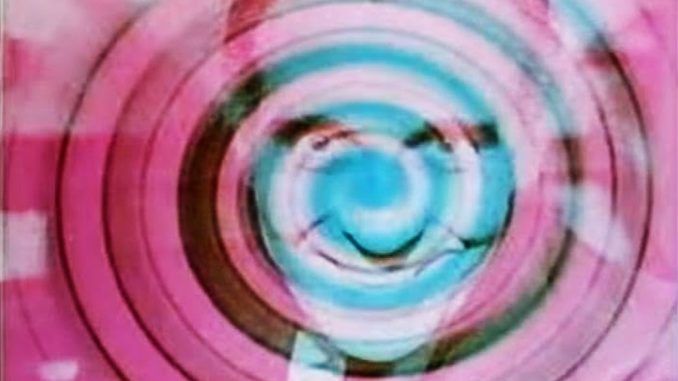
Rating: D+
Dir: T.Y. Drake
Star: Christopher Lee, Tell Schreiber, Ross Vezarian, Ian Tracey
This Canadian production struggled to get distribution, and despite Lee’s name at the top of the cast, ended up sitting on the shelf for almost a decade. It eventually seeped out on television late in 1985, then received a perfunctory video release two years later. I’ve a feeling the odd DVD copies floating around are dodgily sourced from that. Its obscurity is largely justified, unless you are a Lee completist, or a member of the Schreiber family, with Tell being Liev’s dad. It always amused me how Lee would get so sniffy about some of the Hammer movies, then turn around and appear in considerably worse content for other studios. This would be a good example of the latter.
He plays the owner-operator, known as “The Keeper”, of the Underwood Asylum, a high-end loony bin for members of wealthy families. Part of the “therapy” which he carries out there involves hypnotism, but it appears to have a purpose other than establishing mental sanity. For the families in question have a habit of experiencing a high mortality rate, in ways both apparently accidental, and more malicious. Hired by a mysterious client to look into the situation, is a private eye with the kind of name only that profession and one other could possibly have: Dick Driver (Schreiber). His investigation quickly incurs the enmity of local police chief Inspector Clarke (Vezarian), but with the aid of a plucky shoeshine kid (Tracey), Driver discovers the truth behind the Keeper’s activities.
 “Truth” is one thing, “logic” is quite another. For this is one of those films which uses hypnosis, depicted top, as a form of magic, capable of making the victim do whatever is necessary for the plot at the time in question. Anyone can be hypnotized, in just a few seconds, regardless of their will, and any resulting consequences can be hand-waved away just as easily by the Keeper. For instance, an inmate dresses as a police officer, gets a gun, and blazes away at Dick (snooping about, once more), before falling off the roof to the ground below? “We do have some theatrical costumes: role-play is a part of my procedure,” says the owner. This is apparently sufficient explanation to satisfy the authorities fully regarding the incident.
“Truth” is one thing, “logic” is quite another. For this is one of those films which uses hypnosis, depicted top, as a form of magic, capable of making the victim do whatever is necessary for the plot at the time in question. Anyone can be hypnotized, in just a few seconds, regardless of their will, and any resulting consequences can be hand-waved away just as easily by the Keeper. For instance, an inmate dresses as a police officer, gets a gun, and blazes away at Dick (snooping about, once more), before falling off the roof to the ground below? “We do have some theatrical costumes: role-play is a part of my procedure,” says the owner. This is apparently sufficient explanation to satisfy the authorities fully regarding the incident.
Indeed, I’d say the shoe-shine boy may be the most intelligent character in the entire proceedings. As the above shows, it’s not the cops, and nor does it appear to be the owner-operator of the asylum. Or, at least, it’s never quite clear how his scheme was supposed to reach its apparent goal, of making him the richest and most powerful man in the world. Then there’s Dick, whose detective work involves not much more than pretending to be a relative, or getting committed as a patient, and whose employer is… I’ve lost the will to describe the plot convolutions there, except to say there are twins involved. This production is really only of note as one of the earliest films made in Vancouver, now home to a flourishing film industry, of pretending to be America.
